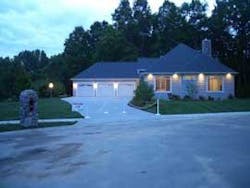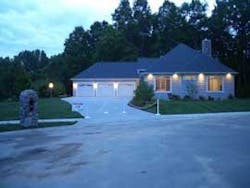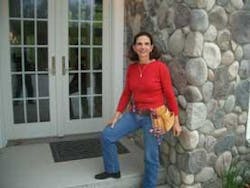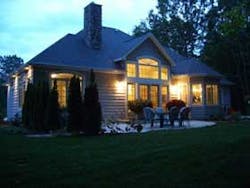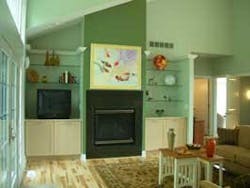Profile of Trudy Wilder .... Building a new career
As hygienists, we are highly skilled in many forms of building: relationships, trust, oral hygiene skills, team. Trudy Wilder, RDH, of St. Joseph, Mich., has added “licensed builder” to her resume and finds the people skills necessary to be a successful homebuilder are the same as in hygiene.
“I really feel that my skills in communication and problem solving that I learned through my experience in the hygiene profession have made it possible for me to do well in construction,” she says.
The similarities are remarkable.
“Dealing with people is so similar in the two professions. In hygiene, patients need help defining their values; how important are their teeth. How do they decide priorities with health issues? In construction, how do clients spend their money? What are their priorities in their new or remodeled home?”
For Trudy, the dental hygiene profession was her first career choice.
“I went into hygiene straight from high school. Why? Because I knew that I wanted a good paying job that was flexible and dealt with health. My sister had gone to nursing school and returned home rather shaken when her first patient died. I know I would not like that kind of stress, so hygiene seemed logical. Besides that, my cousin, Jan, had completed the hygiene program at Ferris State College and was making good money.”
Trudy graduated from the Ferris State Dental Hygiene Program in May 1976 and while awaiting confirmation about passing her hygiene board exam went to work two days later in a general practice and perio specialty practice as an assistant. Once her hygiene license was secured, Trudy’s hygiene career began. “In 1976, those roots weren’t clean until they were glassy smooth, and since I was going to save the world from periodontal disease, I scaled away. I joined the local dental hygiene component, Lakeland Valley, and formed many dental hygiene friendships. I became involved with the component, and even worked on the state level with MDHA,” she said.
Dr. David Willson, a dentist for whom Trudy worked, encouraged the staff to try new techniques and attend CE courses. A problem solver by nature, Trudy soon saw a need for a new service in her community.
“In 1983, I was doing a prophy on my nephew, Peter, and noticed he had an anterior open bite with anterior diastemata. Marge Snow, RDH, MS, was an instructor at Kalamazoo Valley Community College and had just given a course to our local component on this disorder. Since you only see what you know, lo and behold, my nephew shows up with this problem. Being a good hygienist and aunt, I informed my sister that Peter needed braces and to see a speech pathologist or somebody to correct his tongue thrusting.”
The problem was that no one in the area knew how to help a child with tongue thrust, so Trudy and her sister drove for more than an hour to see Marge Snow, the class instructor. “To make a long story short, Marge said, ‘You’re an RN, and you’re an RDH. Here’s my manual; you two can work with Peter.’”
Although successful, Trudy knew she would need more than a manual to help her patients in the future. She soon found a course listed in RDH magazine on orofacial myology. She and her sister headed to Chicago, took the course, and later became orofacial myologists.
“When we completed the course, a local orthodontist was excited to hear how we could help his patients, and he sent us eight clients. We worked with them around my dining room table. I didn’t enjoy keeping my house so clean, so I asked Dr. Willson if we could work out of his office on his day off. Since he encouraged me to always ‘think outside the box,’ he agreed, and the rest is history. My fellow dental hygienists in the component were so supportive of our new venture. In 1987, my sister and I got certified in orofacial myology and worked together treating patients with swallowing disorders, noxious oral habits, and incorrect rest postures.”
A few years later, Trudy was groomed to eventually replace Marge Snow, who was preparing to retire from her orofacial myology teaching position at the Kalamazoo Valley Community College dental hygiene program.
“The school felt it would help their students become better hygienists to have this knowledge, so I stayed there for five years until another instructor, who lived closer to the school, could be trained to take over the position.”
If that wasn’t enough excitement in her life, Trudy also began helping her husband with his general contracting business.
“This was such a busy time for me,” she said. “I was able to drop hygiene days as the orofacial myology practice prospered. When orofacial myology was slow, I could pick up more hygiene time. Hygiene was so valuable - with flexible hours and a good salary behind me, I was able to branch out into new areas. As my husband’s business grew, I was able to help him. Since hindsight is 20/20, I know it was the support of fellow dental hygiene friends, and continuing to be an active member in the ADHA and my local component, that encouraged me to try new avenues, both inside the scope of dental hygiene and beyond.”
The building business became so busy that in 1998, Trudy decided to let her sister take over the orofacial myology practice.
“My husband’s business had developed a 51-lot subdivision and built 40 houses. I still kept my hygiene job for two days a week. I valued my job because it not only provided a steady income, but gave me the professional support I needed.”
In 2003, Trudy’s career changed with her marital status. Once again, she found that she needed hygiene for her financial support. But she realized she also missed the construction field and was not happy thinking she would never build again.
“My sisters encouraged me to get my builder’s license. At first I thought, ‘No way could I ever pass that test!’ But then I thought, ‘Hey, I’m a dental hygienist. I completed a difficult program, passed a difficult board, and even got certified in orofacial myology. I can try to take the Builder’s exam.’”
She passed the exam and is now building her second custom home.
“My first home was entered in the Southwestern Michigan Homebuilder’s Association 2004 Parade of Homes, and it won two awards. One award was for the ‘Best of Interior Design’ and the other was for ‘Best Exterior Site Plan.’ I have done five smaller remodeling projects and continue to pursue other building projects.”
Trudy continues to work two days a week in dental hygiene, but may work more if the practice needs the time and her schedule allows.
“I foresee that I will always practice hygiene to some extent because it really fulfills a need for me. Financially, hygiene gave me independence and flexibility. I’m still active in my local hygiene component. I chaired the CEU committee and planned an all-day seminar for 90 participants in September.”
When Trudy Wilder reflects on her career path, she credits her fellow hygienists and our professional organizations.
“Throughout my 28 career years, I must say that what has helped me most was keeping my memberships alive and being active in my professional organizations. Being in ADHA, the MDHA, and my local Lakeland component has been invaluable for support, networking, and problem solving. Being around other hygienists made me a better hygienist. Being a member of the National Home Builder’s Association has made me a better builder. I found that learning from the experiences of others is so important.”
Cathleen Terhune Alty, RDH, is a frequent contributor. She is based in Clarkston, Mich.
